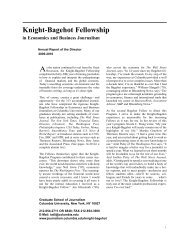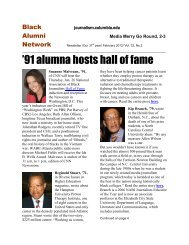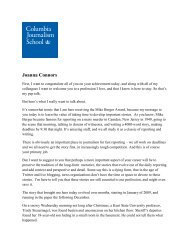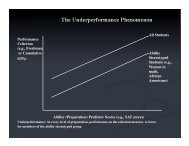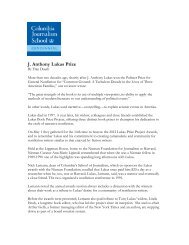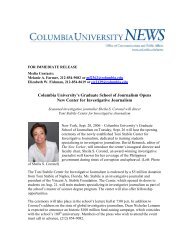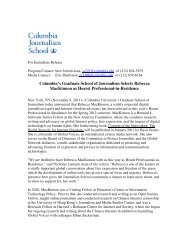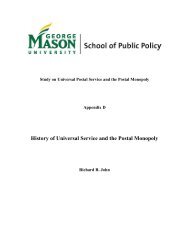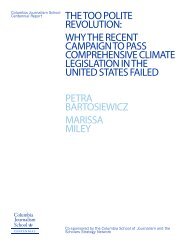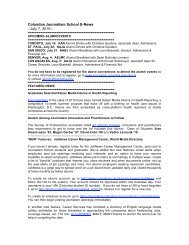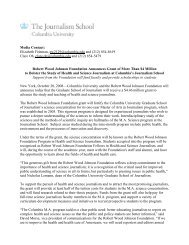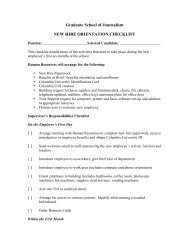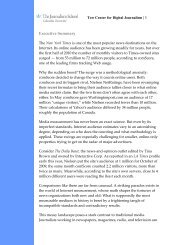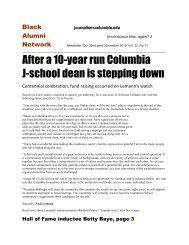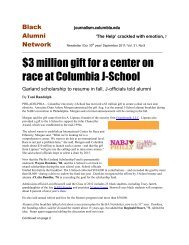Download - Columbia University Graduate School of Journalism
Download - Columbia University Graduate School of Journalism
Download - Columbia University Graduate School of Journalism
Create successful ePaper yourself
Turn your PDF publications into a flip-book with our unique Google optimized e-Paper software.
start<br />
go anywhere
You believe that knowledge is<br />
power. You are curious, openminded,<br />
and like to write. You seek<br />
a life that is fast-paced and exciting.<br />
Your passion about the world and<br />
commitment to the truth have given<br />
you the determination to make a<br />
difference and raise awareness<br />
<strong>of</strong> what’s happening around the<br />
world each day. If journalism is<br />
your calling, answer it at <strong>Columbia</strong>.
For 100 years (and counting)<br />
<strong>Columbia</strong> has led the way to<br />
journalism’s future.<br />
Uniquely positioned at the center <strong>of</strong> America’s news<br />
industry and at one <strong>of</strong> the world’s finest universities,<br />
the <strong>Graduate</strong> <strong>School</strong> <strong>of</strong> <strong>Journalism</strong> is a one-<strong>of</strong>-a-kind<br />
place where Ivy League academics converge with the<br />
rich diversity <strong>of</strong> America’s greatest city.<br />
The World<br />
New York City<br />
Academic Heritage<br />
<strong>Columbia</strong> <strong>University</strong><br />
<strong>Columbia</strong> J <strong>School</strong><br />
Diversity<br />
Pr<strong>of</strong>essional Community<br />
Innovation<br />
Ivy League<br />
Technology
Origins <strong>of</strong> Excellence<br />
Our academic heritage<br />
<strong>Columbia</strong> <strong>Journalism</strong> <strong>School</strong> welcomes<br />
students from more than 40 countries to the<br />
<strong>Columbia</strong> <strong>University</strong> campus in New York<br />
City every year. We are proud to provide the<br />
foundation and opportunity for our students<br />
to succeed, to become leaders in the industry,<br />
and to shape the future <strong>of</strong> journalism.<br />
A solid foundation<br />
Our curriculum covers the bedrock values <strong>of</strong> journalistic<br />
excellence and innovation, ensuring that you will be trained<br />
to thrive in the rapidly changing world <strong>of</strong> digital media.<br />
The courses we <strong>of</strong>fer are unsurpassed in quality and<br />
the breadth <strong>of</strong> subjects they cover. We <strong>of</strong>fer four degree<br />
programs to accommodate different needs and interests.<br />
A century <strong>of</strong> leadership<br />
For one hundred years, the <strong>Journalism</strong> <strong>School</strong> has<br />
championed Joseph Pulitzer’s vision <strong>of</strong> the press as an<br />
indispensable bulwark <strong>of</strong> democracy. We recently<br />
launched thenewyorkworld.com, an accountability<br />
journalism outlet named after Pulitzer’s pioneering paper.<br />
Founder Joseph Pulitzer<br />
Ten years after Joseph Pulitzer first<br />
proposed a world-class journalism<br />
school at <strong>Columbia</strong>, classes began<br />
on September 30, 1912. Seventy-nine<br />
undergraduate and graduate students<br />
enrolled, including a dozen women.<br />
Classes convened at several locations<br />
around campus until the <strong>Journalism</strong><br />
building opened in 1913, and in 1917<br />
the first Pulitzer Prizes were awarded.<br />
Upholding Pulitzer’s Legacy<br />
“A journalist is the lookout on the<br />
bridge <strong>of</strong> the ship <strong>of</strong> state,” Joseph<br />
Pulitzer wrote. “The power to mould<br />
the future <strong>of</strong> the Republic will be in<br />
the hands <strong>of</strong> the journalists <strong>of</strong> future<br />
generations.” As the <strong>Journalism</strong><br />
<strong>School</strong> moves forward, embracing the<br />
challenges and opportunities <strong>of</strong> the<br />
21st century, Pulitzer’s legacy endures.<br />
Under the leadership <strong>of</strong> Dean Nicholas<br />
Lemann and a distinguished faculty,<br />
the <strong>Journalism</strong> <strong>School</strong> continues<br />
to educate top journalists, uphold<br />
standards <strong>of</strong> excellence for the<br />
pr<strong>of</strong>ession as a whole, and guide the<br />
press to strive for the public good.<br />
This stained glass window is a relic<br />
<strong>of</strong> Pulitzer’s World Building. It now<br />
adorns <strong>Columbia</strong> <strong>Journalism</strong> <strong>School</strong>’s<br />
World Room where the Pulitzer Prizes<br />
are announced each year.<br />
2 COLUMBIA GRADUATE SCHOOL OF JOURNALISM JOURNALISM.COLUMBIA.EDU
Like the city it calls home,<br />
<strong>Columbia</strong> <strong>Journalism</strong> <strong>School</strong><br />
never sleeps. There is<br />
always a flow <strong>of</strong> students,<br />
faculty, alumni, and<br />
distinguished guests.<br />
At <strong>Columbia</strong>, innovators<br />
and global thought leaders<br />
are always on campus.<br />
Learn from the best<br />
James Stewart—Bloomberg<br />
Pr<strong>of</strong>essor <strong>of</strong> Business <strong>Journalism</strong>,<br />
New York Times columnist, and<br />
Pulitzer Prize-winning author <strong>of</strong><br />
several bestsellers—works closely<br />
with students in the M.A. program.<br />
Enduring<br />
connections<br />
Forging bonds<br />
Collaborating closely on a wide<br />
variety <strong>of</strong> projects, students<br />
establish connections that<br />
enhance their careers and develop<br />
friendships that last a lifetime.<br />
Students<br />
Our students come from a wide<br />
range <strong>of</strong> backgrounds, some with<br />
considerable journalism experience<br />
and some with none. They are<br />
teachers, lawyers, doctors, military<br />
<strong>of</strong>ficers, engineers, athletes,<br />
playwrights, artists, business<br />
people, scientists, accountants,<br />
photographers, authors, farmers,<br />
designers and more. What our<br />
students share with each other<br />
and with our faculty is a passion<br />
for journalism and the talent to<br />
excel. <strong>Columbia</strong> is the only Ivy<br />
League school <strong>of</strong> journalism, and<br />
students here have access to the<br />
resources <strong>of</strong> one <strong>of</strong> the world’s<br />
great universities.<br />
Faculty<br />
Our faculty consists <strong>of</strong> nationally<br />
recognized journalists with<br />
specialties that include politics,<br />
arts and culture, religion,<br />
science, education, business and<br />
economics, investigative reporting,<br />
and national and international<br />
affairs. They have won numerous<br />
journalism awards, including the<br />
Pulitzer Prize, the Guggenheim<br />
Fellowship, the Alfred I. duPont-<br />
<strong>Columbia</strong> <strong>University</strong> Award, the<br />
News & Documentary Emmy Award,<br />
the National Magazine Award, and<br />
the National Book Award. Because<br />
our classes are small by design,<br />
students have the opportunity to<br />
work closely with each pr<strong>of</strong>essor,<br />
receiving one-on-one mentoring<br />
inside and outside the classroom<br />
on writing, reporting, and research.<br />
Alumni<br />
Our alumni can be found at<br />
prestigious news organizations<br />
around the world, where they<br />
are active in every phase <strong>of</strong><br />
making the news. From reporting<br />
to photography, from editing to<br />
producing, and from publishing<br />
to digital innovation, <strong>Columbia</strong><br />
journalists do it all. In addition<br />
to the relationships they forge as<br />
students, alumni have access to<br />
our extensive alumni network <strong>of</strong><br />
unparalleled contacts in all areas<br />
<strong>of</strong> journalism. And they are always<br />
welcome at Pulitzer Hall.
Academic programs<br />
we work<br />
everywhere:<br />
• ABC News<br />
• The Denver Post<br />
• msnbc.com<br />
• Slate<br />
• Agence France-Presse<br />
• Detroit Free Press<br />
• National Public Radio<br />
• South China Morning Post<br />
• Aspen Magazine<br />
• The Economist Group<br />
• NBC News<br />
• Sports Illustrated<br />
• Associated Press<br />
• Financial Times<br />
• Newsweek / The Daily Beast<br />
• thestreet.com<br />
• The Atavist<br />
• Forbes<br />
• New York Daily News<br />
• Time<br />
• Atlantic Media<br />
• Fortune<br />
• New York<br />
• The Village Voice<br />
• Barron’s<br />
• GlobalPost<br />
• The New York Times<br />
• The Washington Post<br />
• Bloomberg News<br />
• The Huffington Post<br />
• patch.com / AOL News<br />
• The Wall Street Journal<br />
• bostonglobe.com<br />
• KQED (San Francisco)<br />
• PBS NewsHour<br />
• Univision<br />
• CBS News<br />
• Los Angeles Times<br />
• ProPublica<br />
• Wired<br />
• CNN<br />
• mashable.com<br />
• Reuters<br />
• Chicago Tribune<br />
• The Miami Herald<br />
• Sacramento Bee<br />
• Condé Nast<br />
• Money<br />
• Scientific American
<strong>Columbia</strong> doesn’t just teach<br />
students what they don’t<br />
know—it discovers and creates<br />
knowledge for our changing<br />
world. <strong>Columbia</strong> journalists<br />
learn how to uncover, analyze,<br />
and explain the stories <strong>of</strong> our<br />
time—and to create the first<br />
draft <strong>of</strong> history.<br />
Mastering your craft<br />
Students hone their<br />
skills with accomplished<br />
journalists like Pr<strong>of</strong>essor<br />
LynNell Hancock and with<br />
their close-knit classes <strong>of</strong><br />
rising talent.
Academic programs<br />
No matter who you are, what you want to<br />
cover, or how you want to report on it, one<br />
<strong>of</strong> <strong>Columbia</strong> <strong>Journalism</strong> <strong>School</strong>’s carefully<br />
designed academic programs will take you<br />
anywhere you want to go.<br />
Master <strong>of</strong> Science<br />
The 10-month M.S. program <strong>of</strong>fers aspiring and experienced journalists the opportunity to study<br />
the skills, the art and the ethics <strong>of</strong> journalism by reporting and writing stories ranging from short<br />
news pieces to complex narrative features. With New York City as their laboratory, students learn<br />
how to think critically and deeply, and to be both ethical and street smart. During the year, you will<br />
acquire a core set <strong>of</strong> sophisticated newsgathering skills that emphasize in-person, interview-based<br />
reporting as well as other means <strong>of</strong> acquiring and assessing information. You’ll take a course from<br />
each <strong>of</strong> three modules: The Written Word; Image and Sound; and Audience and Engagement. These<br />
courses focus on topics ranging from deadline newswriting to interactive graphics, from social<br />
media to video skills. During the year, you will complete a long form master’s project, as well as<br />
take core classes in law, ethics, history and the business <strong>of</strong> journalism.<br />
Applicants interested in investigative reporting may apply to the Stabile Center for Investigative<br />
<strong>Journalism</strong>, a sub-specialization within the M.S. program. We also <strong>of</strong>fer dual degree programs with<br />
the schools <strong>of</strong> engineering, business, law, international and public affairs, and the religion program<br />
at the <strong>Graduate</strong> <strong>School</strong> <strong>of</strong> Arts and Sciences. You may also consider our international dual degree<br />
programs with Sciences Po in Paris and the <strong>University</strong> <strong>of</strong> Witwatersrand in Johannesburg. Students<br />
may also enroll in the M.S. program in <strong>Journalism</strong> on a part- or a full-time basis.<br />
Application<br />
deadlines<br />
december 3<br />
Master <strong>of</strong> Science<br />
international dual-degree<br />
programs<br />
• With Sciences Po, Paris<br />
• With <strong>University</strong> <strong>of</strong> Witwatersrand,<br />
Johannesburg<br />
december 17<br />
Master <strong>of</strong> Science<br />
Master <strong>of</strong> Science<br />
dual-degree programs<br />
• <strong>Journalism</strong> and Law<br />
• <strong>Journalism</strong> and Business<br />
• <strong>Journalism</strong> and Religion<br />
• <strong>Journalism</strong> and International<br />
and Public Affairs<br />
Ph.D. in Communications<br />
January 15<br />
Master <strong>of</strong> Science<br />
in Computer Science<br />
and <strong>Journalism</strong><br />
Master <strong>of</strong> Arts
Making the news<br />
From field reporting to<br />
broadcasting on air to the<br />
latest in digital production,<br />
<strong>Columbia</strong> students are<br />
immersed in every element<br />
<strong>of</strong> today’s journalistic world.<br />
ADDITIONAL PROGRAMS<br />
Our continuing education seminars,<br />
executive education, and fellowships <strong>of</strong>fer<br />
opportunities for experienced practitioners<br />
and media executives to advance their<br />
knowledge and expertise. These include:<br />
• Punch Sulzberger Program<br />
for executive leadership<br />
sulzbergerprogram.org<br />
• The Spencer Fellowship for<br />
Education Reporting<br />
www.journalism.columbia.edu/spencer<br />
• The Knight-Bagehot Fellowship<br />
www.journalism.columbia.edu/<br />
knight-bagehot<br />
• <strong>Columbia</strong> Publishing Course<br />
www.journalism.columbia.edu/publishing<br />
Master <strong>of</strong> Arts<br />
The 9-month M.A. program is for experienced<br />
journalists who would like to deepen their<br />
knowledge <strong>of</strong> one <strong>of</strong> four subject areas:<br />
politics, arts and culture, science, or business.<br />
The program is designed to impart the skills<br />
and habits <strong>of</strong> reflection that will enable you to<br />
cover complicated issues in a sophisticated,<br />
nuanced manner. You will develop the<br />
knowledge and confidence to ask more<br />
informed questions, to situate news events<br />
in their larger context, and to evaluate<br />
competing claims made by sources. Since<br />
M.A. students already know how to report<br />
and write well, we challenge you to raise your<br />
game, and specifically to create new ways<br />
<strong>of</strong> telling stories that are informed by deep<br />
understanding <strong>of</strong> complex subjects. You read<br />
heavily and you work closely with <strong>Journalism</strong><br />
<strong>School</strong> pr<strong>of</strong>essors as well as pr<strong>of</strong>essors from<br />
other academic departments at the <strong>University</strong>.<br />
The primary journalistic work <strong>of</strong> the year is the<br />
master’s thesis, which is an ambitious piece<br />
<strong>of</strong> long form journalism. The M.A. program<br />
is available full time only and runs from late<br />
August into May.<br />
Master <strong>of</strong> Science in Computer<br />
Science and <strong>Journalism</strong><br />
This innovative program, which accepted its<br />
first students in 2011, <strong>of</strong>fers dual Master <strong>of</strong><br />
Science degrees in computer science and<br />
journalism. A close collaboration between<br />
the Engineering and <strong>Journalism</strong> schools, the<br />
program uses the content <strong>of</strong> one discipline<br />
to inform the execution <strong>of</strong> the other, providing<br />
unique and highly specialized training in<br />
the digital environment including technical<br />
and editorial skills in many aspects <strong>of</strong><br />
computer-supported news gathering and<br />
digital media production. The goal is not<br />
only to impart expertise in today’s digital<br />
news realm, but also to equip graduates to<br />
refine and create new news gathering and<br />
digital media technologies that will redefine<br />
journalism as we know it. You enroll in classes,<br />
including seminars and workshops, at both<br />
the <strong>Journalism</strong> and Engineering schools for a<br />
total <strong>of</strong> four semesters. Applicants must have<br />
academic backgrounds in computer science<br />
or in mathematics and engineering, have<br />
excellent writing skills and be familiar with<br />
the fundamentals <strong>of</strong> reporting.<br />
Doctor <strong>of</strong> Philosophy in<br />
Communications<br />
The Ph.D. in Communications <strong>of</strong>fers a<br />
multidisciplinary approach to the study <strong>of</strong><br />
the relationships between people and media<br />
in their cultural, social, political, historical,<br />
economic, and technological contexts. With<br />
the guidance <strong>of</strong> a faculty advisory committee<br />
drawn from the <strong>Journalism</strong> <strong>School</strong>, the<br />
<strong>Graduate</strong> <strong>School</strong> <strong>of</strong> Arts and Sciences, the<br />
<strong>School</strong> <strong>of</strong> International and Public Affairs,<br />
the Business <strong>School</strong>, and Teachers College,<br />
you craft individual courses <strong>of</strong> study drawing<br />
upon the university’s graduate resources<br />
in the humanities, the social and practical<br />
sciences, the arts, and the pr<strong>of</strong>essional<br />
schools. The goal is to connect the strengths<br />
<strong>of</strong> the <strong>Columbia</strong> journalism tradition with<br />
the outstanding intellectual work in the<br />
humanities and human sciences elsewhere<br />
at the university in a way that enhances our<br />
understanding <strong>of</strong> media and journalism in<br />
society. The interdisciplinary program provides<br />
a unique preparation for students who wish<br />
to teach in colleges and universities, to<br />
conduct original research in communications,<br />
or to carry out policy or research work in<br />
government and industry.
At <strong>Columbia</strong> and in the<br />
kaleidoscopic metropolis<br />
that is New York City, you<br />
truly become a citizen <strong>of</strong><br />
the world—with friends<br />
and connections on<br />
campus, across the city,<br />
and around the globe.<br />
Life at <strong>Columbia</strong><br />
and in NYC<br />
NYC is Unparalleled<br />
• New York is the ‘capital <strong>of</strong> the world’<br />
for media, journalism, and just about<br />
everything else—including the arts,<br />
finance and international politics.<br />
• Eight million people live in the City <strong>of</strong><br />
New York. Nearly 200 languages are<br />
spoken daily, and there are dozens <strong>of</strong><br />
unique ethnic communities throughout<br />
the city’s five boroughs.<br />
• Morningside Heights, <strong>Columbia</strong>’s<br />
home neighborhood, boasts an<br />
impressive array <strong>of</strong> academic institutions<br />
situated in the heart <strong>of</strong> Upper<br />
Manhattan near historic Harlem,<br />
Central Park and Riverside Park.<br />
• New York’s famous 24/7 subway<br />
system has a stop right outside<br />
<strong>Columbia</strong>’s gates at 116th Street.<br />
At school and on the beat<br />
Student life at the <strong>Journalism</strong> <strong>School</strong> incorporates more than just<br />
course work. Our students study journalism through covering the<br />
intricate and diverse neighborhoods <strong>of</strong> New York City, with close<br />
guidance and mentoring from their pr<strong>of</strong>essors. Students form<br />
intense bonds during their time at the <strong>School</strong> and <strong>of</strong>ten develop<br />
lifelong friendships with fellow students as well as with faculty.<br />
Every week, our students are invited to attend and participate in<br />
lectures, workshops, conferences, and receptions with leaders<br />
in journalism who visit the <strong>School</strong>. The student government is<br />
run through the <strong>University</strong> chapter <strong>of</strong> the Society <strong>of</strong> Pr<strong>of</strong>essional<br />
Journalists, the world’s largest journalism organization. Student<br />
<strong>of</strong>ficers organize events throughout the year, including field trips,<br />
panels, and community service projects.<br />
Resources<br />
The Stabile Student Center, completed in 2008, is the <strong>Journalism</strong><br />
<strong>School</strong>’s social hub, with a café, computer work stations, teaching<br />
labs, conference rooms, and the school library. Technical resources<br />
at the <strong>School</strong> include more than 150 multi-media computers in<br />
labs, edit suites, and social areas; the Roone Arledge broadcast<br />
studio; a radio studio, and an equipment room housing hundreds<br />
<strong>of</strong> media production kits for photography, audio, video, and digital<br />
media. Computer labs <strong>of</strong>fer Apple operating systems and media<br />
s<strong>of</strong>tware suites such as Pro Tools, Final Cut Pro, and Adobe Creative<br />
Suite Premium. Students also gain access to the university’s worldrenowned<br />
library and other technological <strong>of</strong>ferings, along with<br />
guidance from highly-trained university staff.<br />
8 COLUMBIA GRADUATE SCHOOL OF JOURNALISM JOURNALISM.COLUMBIA.EDU
Student work<br />
Our students publish their work in a rich array <strong>of</strong> platforms<br />
throughout their time at the <strong>Journalism</strong> <strong>School</strong>, including<br />
columbiajournalist.org, the online student publication portal <strong>of</strong><br />
the school; thebrooklynink.com and bronxink.org, online news<br />
sites dedicated to coverage <strong>of</strong> those boroughs; <strong>Columbia</strong> News<br />
Service, a wire service that publishes student features in dailies<br />
around the country through The New York Times News Service;<br />
“<strong>Columbia</strong> News Tonight,” the weekly spring television newscast<br />
produced by our students; and the digital media workshops,<br />
combining traditional reporting and writing skills with the best <strong>of</strong><br />
online journalism. Opportunities also arise each year to publish<br />
work in a variety <strong>of</strong> special projects devoted to exploring particular<br />
issues or communities, especially those traditionally underserved<br />
by the news media. And, many students land their reporting in<br />
other publications, in New York City and beyond.<br />
Career services<br />
Our Career Services staff—all former journalists with strong<br />
industry connections in print, broadcast, and digital media—<br />
work closely with you to help you pursue the most meaningful jobs<br />
and internships in the U.S. and abroad. Students are invited to meet<br />
with a Career Services counselor for one-on-one consultations<br />
during the school year and are encouraged to attend weekly panels<br />
and workshops with guest editors and job-hunting strategy sessions<br />
hosted at the <strong>School</strong>. Our annual spring career expo is the biggest<br />
journalism job fair in the nation. This year, more than 200 recruiters<br />
and editors from 111 news organizations attended. The companies<br />
sought candidates for more than 250 full-time jobs, internships,<br />
fellowships and freelance positions. Our dynamic proprietary<br />
website, accessible only to <strong>Columbia</strong> students and alumni, includes<br />
guides, audio archives from past speakers, tips about job hunting,<br />
employer pr<strong>of</strong>iles, and a jobs database that is updated daily.
By the numbers<br />
TOTAL ANTICIPATED STUDENT<br />
ENROLLMENT 2012–2013<br />
272<br />
Master <strong>of</strong> Science (full time)<br />
80<br />
Master <strong>of</strong> Science (part time)<br />
9Master <strong>of</strong> Science Dual Degree<br />
with Computer Science<br />
59<br />
Master <strong>of</strong> Arts<br />
32<br />
Doctor <strong>of</strong> Philosophy<br />
DEMOGRAPHICS (FULL TIME)<br />
International Students.... 32%<br />
Female.................. 67%<br />
Male.................... 33%<br />
Average Age............... 27<br />
AMONG AMERICAN STUDENTS<br />
Asian American.......... 12%<br />
Black/African American... 12%<br />
Latino/Hispanic........... 9%<br />
White/Caucasian......... 22%<br />
Other.................... 1%<br />
Unreported.............. 44%<br />
APPLICATIONS FOR FULL-TIME<br />
STUDY 2012–2013<br />
Master <strong>of</strong> Science<br />
Applicants................816<br />
Admits................... 401<br />
Expected to Enroll.........272<br />
Master <strong>of</strong> Arts<br />
Applicants............... 228<br />
Admits....................69<br />
Expected to Enroll.......... 59<br />
Doctor <strong>of</strong> Philosophy<br />
Applicants.................83<br />
Admits..................... 4<br />
Expected to Enroll........... 4<br />
ALUMNI<br />
10,506<br />
Total Living Alumni<br />
1,126<br />
Alumni Living Overseas<br />
COST OF ATTENDANCE<br />
2012–2013<br />
Master <strong>of</strong> Science<br />
Tuition.............. $49,432<br />
Fees.................. $5,914<br />
Living................$25,876<br />
TOTAL...............$81,222<br />
Master <strong>of</strong> Science in Computer<br />
Science and <strong>Journalism</strong><br />
Tuition.............. $46,480<br />
Fees.................. $5,914<br />
Living................$25,876<br />
TOTAL...............$78,270<br />
Master <strong>of</strong> Arts / Ph.D.<br />
Tuition.............. $44,992<br />
Fees.................. $5,914<br />
Living............... $23,466<br />
TOTAL............... $74,372<br />
ANTICIPATED SCHOLARSHIP /<br />
FELLOWSHIP FUNDING 2012–2013<br />
Master <strong>of</strong> Science<br />
$1,816,242<br />
67% <strong>of</strong> those who applied for<br />
scholarship aid received funding.<br />
range <strong>of</strong> awards<br />
$363 – $62,144<br />
average award<br />
$11,094<br />
Master <strong>of</strong> Science in Computer<br />
Science and <strong>Journalism</strong><br />
$261,325<br />
100% <strong>of</strong> those who applied for<br />
scholarship aid received funding.<br />
range <strong>of</strong> awards<br />
$36,438 – $56,514<br />
average award<br />
$35,060<br />
Master <strong>of</strong> Arts<br />
$1,615,053<br />
94% <strong>of</strong> those who applied for<br />
scholarship aid received funding.<br />
range <strong>of</strong> awards<br />
$3,036 – $74,572<br />
average award<br />
$31,668<br />
Doctor <strong>of</strong> Philosophy<br />
All entering doctoral students receive<br />
funding. They normally receive a tuition<br />
waiver for the first two or three years <strong>of</strong><br />
course work, a stipend for the first three<br />
years <strong>of</strong> study, and medical coverage<br />
for several years <strong>of</strong> their studies. They<br />
are also eligible for research or teaching<br />
assistantships.<br />
10 COLUMBIA GRADUATE SCHOOL OF JOURNALISM JOURNALISM.COLUMBIA.EDU
COUNTRIES REPRESENTED<br />
2012–2013<br />
AUSTRALIA<br />
AUSTRIA<br />
BAHRAIN<br />
BOSNIA &<br />
HERZEGOVINA<br />
BRAZIL<br />
CANADA<br />
CHILE<br />
CHINA<br />
COLOMBIA<br />
DENMARK<br />
FRANCE<br />
GERMANY<br />
GHANA<br />
GREECE<br />
HAITI<br />
INDIA<br />
IRELAND<br />
ISRAEL<br />
ITALY<br />
JAPAN<br />
KENYA<br />
MEXICO<br />
NEPAL<br />
NIGERIA<br />
PAKISTAN<br />
PHILIPPINES<br />
POLAND<br />
SINGAPORE<br />
SOUTH AFRICA<br />
SOUTH KOREA<br />
SPAIN<br />
SWEDEN<br />
TAIWAN<br />
TRINIDAD &<br />
TOBAGO<br />
TURKEY<br />
UNITED ARAB<br />
EMIRATES<br />
UNITED<br />
KINGDOM<br />
Commitment to Diversity<br />
The <strong>Graduate</strong> <strong>School</strong> <strong>of</strong> <strong>Journalism</strong> is committed<br />
to creating and supporting a community that is<br />
diverse in every way. We <strong>of</strong>fer a curriculum as<br />
pluralistic and polyphonic as New York itself,<br />
and a community <strong>of</strong> scholars who embody this<br />
commitment to open discussion and debate.<br />
Diversity is one <strong>of</strong> the things that makes the<br />
<strong>Journalism</strong> <strong>School</strong> vibrant and exciting, and our<br />
students find a setting that allows them to explore<br />
diversity in a variety <strong>of</strong> ways, at a university<br />
that prides itself on serious intellectual inquiry<br />
and the exploration <strong>of</strong> diverse ideas. This is the<br />
transformative power <strong>of</strong> diversity in education:<br />
its ability to enrich the individual as it enriches<br />
the community and society as a whole.<br />
<strong>Journalism</strong> Awards<br />
The <strong>Journalism</strong> <strong>School</strong> administers many pr<strong>of</strong>essional awards to uphold standards<br />
<strong>of</strong> excellence in the media, a tradition that Joseph Pulitzer began when he established<br />
the school and endowed the Pulitzer Prizes at <strong>Columbia</strong>.<br />
✽✽<br />
Pulitzer Prizes<br />
✽✽<br />
The Alfred I. duPont-<strong>Columbia</strong><br />
<strong>University</strong> Awards for Broadcast<br />
✽✽<br />
National Magazine Award<br />
✽✽<br />
The Maria Moors Cabot Prizes<br />
✽✽<br />
John B. Oakes Awards<br />
✽✽<br />
John Chancellor Award for<br />
Excellence in <strong>Journalism</strong><br />
✽✽<br />
Lukas Prize Project<br />
✽✽<br />
Mike Berger Award<br />
✽✽<br />
Paul Tobenkin Memorial Award<br />
Dart center<br />
The Dart Center for <strong>Journalism</strong> and Trauma, dedicated to informed,<br />
innovative and ethical news reporting on violence, conflict and tragedy,<br />
provides training and resources for journalists and news organizations<br />
worldwide. dartcenter.org<br />
David and Helen Gurley Brown Institute<br />
for Media Innovation<br />
Thanks to the largest gift in its history, <strong>Columbia</strong> <strong>Journalism</strong> <strong>School</strong> will<br />
soon be home to the groundbreaking and bicoastal new David and Helen<br />
Gurley Brown Institute for Media Innovation. Under the leadership <strong>of</strong><br />
newly appointed director, Mark Hansen, faculty, fellows and researchers<br />
at the Institute will work closely with colleagues at Stanford <strong>University</strong>'s<br />
Engineering <strong>School</strong>. Their goal is to foster journalistic innovation and<br />
use competitive grants to seed promising projects, while the J-<strong>School</strong>'s<br />
historic Pulitzer Hall will host a high tech newsroom. Bridging America’s<br />
east and west coasts, the Brown Institute will cultivate working<br />
relationships with top business leaders and media companies to link its<br />
advances to the market. The Institute also will engage with students at<br />
<strong>Journalism</strong> and other <strong>Columbia</strong> schools to further understanding and<br />
innovation in media.<br />
Tow Center for<br />
Digital <strong>Journalism</strong><br />
The Tow Center for Digital<br />
<strong>Journalism</strong>, which opened in<br />
Fall 2010, <strong>of</strong>fers students the<br />
skills, experience, and knowledge<br />
to become leaders in digital<br />
journalism and also serves as a<br />
research and development center<br />
for the pr<strong>of</strong>ession as a whole.<br />
The Center explores how the<br />
development <strong>of</strong> technology is changing journalism, its practice and its<br />
consumption—particularly as consumers <strong>of</strong> news seek ways to judge the<br />
reliability, standards, and credibility <strong>of</strong> information. It also devises and<br />
publicizes innovative methods <strong>of</strong> digital reporting and presentation for<br />
both established media companies and new startups. The Center director,<br />
Emily Bell, oversees original scholarly research and explores a variety<br />
<strong>of</strong> new models by which news organizations can sustainably create and<br />
deliver high quality content to their audiences. The Tow Center recently<br />
accepted a $2 million grant from the Knight and Tow Foundations to explore<br />
best practices for maximizing the impact <strong>of</strong> digital news. towcenter.org
Pulitzer Hall<br />
2950 Broadway<br />
(at 116 Street)<br />
New York, NY 10027<br />
Admissions Office<br />
212-854-8608<br />
admissions@jrn.columbia.edu<br />
journalism.columbia.edu



